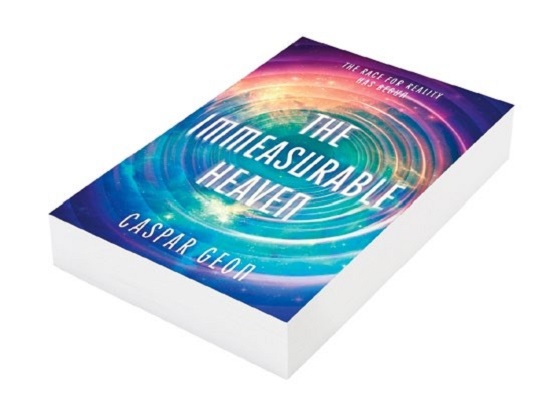
Set a couple of billion years ago in a galaxy far, far away, the inhabitants of Yokkun's Depth - humanoidish and otherwise - are long used to a more or less peaceful co-existence. In the heart of every star resides the immensely powerful post-machine intelligences, the Throlken. They have manipulated and shaped the galaxy's biological species for over 300m years, and have given it a common language, a light touch governance structure, and a unified economy. There is no war, nor any violence. For Yokkun's Depth is a hyper-Foucauldian space. With swarms of their microscopic servants inhabiting every litre of air and not a few volumes of vacuum, violent acts are stopped by liquefying the perpetrator's brain.
The galaxy has another feature. A well that leads to layers of reality beneath the surface. These can be accessed by falling into the well, or coating oneself in iliquin, a special mineral that punctures the membrance between realities. Messages can be sent up and down the realities, or phaslairs, and they have been variously colonised by what passes for the powers of Yokkun's Depth. The Throlken, for example, are omnipresent in many of them. But the physics of sliding between the layers is one-way. Someone can travel down, but they cannot come up again. Consternation verges on panic when there is a suggestion of someone, or something, has found their way around the laws of reality and are ascending through the phaslairs. How, and more importantly, why, is a complete unknown. Even the all-powerful Throlken are disturbed and none-the-wiser.
This is the set up. A world that heaps one novum on to another in quick succession. The plot revolves around three people. Yib'Wor, who begins the novel scratching an existence out of and trying to escape a dead world, Whirazomar (Whira), an agent sent to the well to investigate and, if needs be, stop the rising entity, and Draebol, a surveyor of phaslairs and the maker of a map of the realities - something that would be sought after, if it was ever to be put up for sale. They are three characters whose paths are sure to cross eventually.
The Immeasurable Heaven is certainly a flavoursome novel. Perhaps too flavoursome given the funky, gunky habits of many of the species we're introduced too. It's well written and has that good-humoured vibe common among contemporary British science fiction writers. The dialogue is spot on, and there are some memorable characters. Such as Gnumph, a "megaspore" who swallows its passengers and stows them in its stomach as it zips about the galaxy. I do think the plot, however, could have been better defined and it is sometimes lost among the verdant prose. Also in common with much current UK SF, multiplicity has a strong presence. But unlike Adrian Tchaikovsky and MR Carey, the plot does not hinge upon it. While the aforementioned draw dynamism from the struggle between, I suppose, territoriality and deterritorialisation, of trying to force everything into a mould versus live-and-let-live, Yokkun's Depth has none of this. The Throlken police violence and they have fenced off sections of the galaxy, but that's more or less the extent of their contemporary involvement. The rising entity certainly conducts its relations with others through a strictly instrumental lens, but its ultimate goal is not about imposing a straitjacket or a prison on the galaxy.
Geon/Toner is forced to impose some reterritorialisation of his own to make a novel out of his book. The aliens are varied and weird, but their cultures and psychologies much less so. Whether an eight-winged monstrosity, a be-slippered centipede analogue, or sentient parasites inhabiting the nostrils of their host, these characters are very human. Only the Throlken remain inscrutable. Compared, again, with Tchaikovsky whose work can be characterised as posthumanist SF thanks to the level of detail that goes into constructing psychologically-convincing non-human protagonists, there perhaps could have been room here for some similar exploration. Second, for all the wonderful weirdness, the socioeconomic system that unites Yokkun's Depth and other civilised phaslairs is ... capitalism. Characters want to be wealthy. Characters have to buy things. Characters have to rent out rooms (and, on one occasion, a floating junkberg on the edge of a solar system). It's easier to imagine alternative biologies than alternatives to capitalism, to put a spin on Fredric Jameson. As such the world building only goes so far, and not far enough into the truly alien. Lastly, for a seething novel bursting with life forms, the publisher - Solaris - could not have cranked out a more boring cover. Do they not believe in catching the buying public's eye?
These criticism aside, The Immeasurable Heaven will probably benefit from a reread. There is a lot going on here away from the plot line, and there are details that could be savoured on the second trip through. It is a recommend to SF readers, certainly, and it will be getting a nomination from me for the longlist of the British Science Fiction Association awards this year. And I hope there are more adventures and explorations of this setting to come.
2 comments:
Capitalism without violence, you say?
Do the AI gods take it upon themselves to evict people/things who can't pay their rent?
It seems necessary to point out that the "truly alien" is by definition unattainable in fiction which is written and read by humans (or rather, if it was there, you probably wouldn't notice it). It's just as impossible as "futurology" predicting the actual future in detail. In science fiction and in futurology, in reality, the blind spots are often as important as the flashes of startling insight and prescience.
However, if you want a 100% alien cast - and for that matter a universe completely divorced from our own, aside from sharing the same mathematical basis - Egan's Orthogonal series is right there. The aliens are very sympathetic, but hey, convergent psychology.
Post a Comment